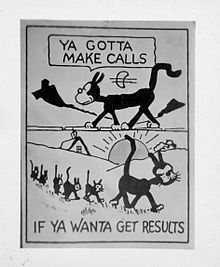innuendo
An allusion indicates a situation that should not or cannot be stated in a clear choice of words. It is kept neutrally a hint , or with hidden criticism a swipe , also called teasing or pointed (or pointed remark or similar).
In everyday life, allusions are often used for encrypted communication, for example through hints or catchwords , the context of which is not understood by third parties present.
General
Allusions can often be seen in the diverse use of terms or gestures that arouse associations with their original (narrower) areas of use. For example, the use of terms derived from the areas of sexuality or elimination is very common.
- Example: The adjective geil , which actually means luxuriantly rampant (in the plant world), also translated lascivious or excited (in the sexual sense), is now used in various other contexts as an expression of joyful sympathy and is now even used as a catchphrase in advertising ( “ Avarice is cool ”). Despite their use in different areas, the closer contexts of meaning of such terms are conveyed - more or less consciously - with the original context being alluded to . If, on the other hand, the original meaning falls into general oblivion, its function as an allusion expires and the term experiences a change in meaning .
A popular pastime of some people is the search for allusions that are not intended by the other person (for example, listening to sexual allusions even though they knowingly do not affect the actual statement at all) and corresponding verbal replies. In addition to playful and friendly motives, the aim of this behavior can be to expose or shame the other person. Depending on the severity and context, it can be mobbing or sexual harassment in the latter sense . Condescending allusions that are aimed at the person can, depending on the severity, be a defamation in the criminal sense.
Allusions are a standard method of poetry , for example to describe facts in a metaphorical way or to symbolically unite different processes and thus to clarify a certain emotion or state of mind. The allusions flourish under literary censorship , but are often also suspected in reception where they are not intended.
In science it is daring, but permissible, and was previously identified with the Latin phrase sapienti sat (“it is enough for the knowing”) as an allusion .
Discourse-theoretical special meaning
“Linguistics of allusion” describes a discourse theoretical concept of Franz Januschek in linguistics. It is therefore essential for this concept that the meaning of a discourse can only be inferred when the level of allusions is examined - however, not individual chains of association, but systematic allusions. In order to understand this, the examined form of expression within a discourse is compared with all other forms of expression in it.
literature
- Franz Januschek: work on language. Concept for an empirical study of political linguistics , Opladen 1986.
- Franz Januschek: Right-wing populism and Nazi allusions using the example of the Austrian politician Jörg Haider , Duisburg 1991.
